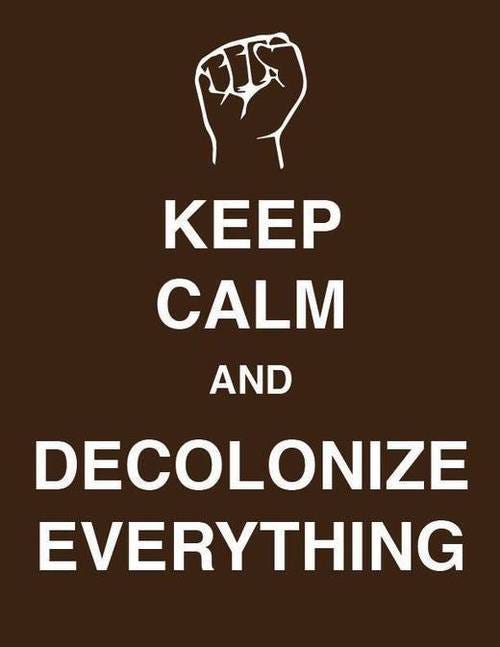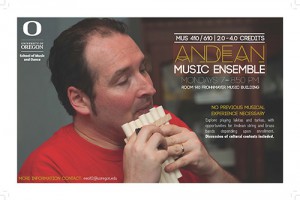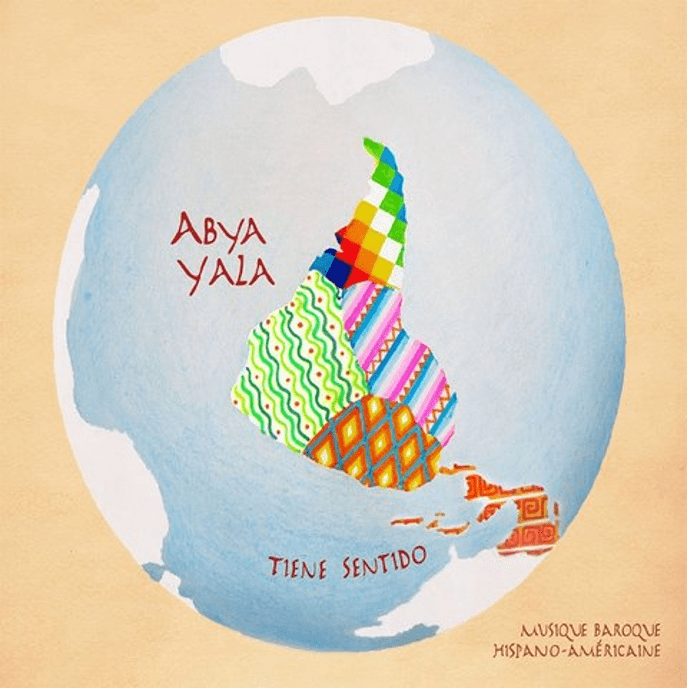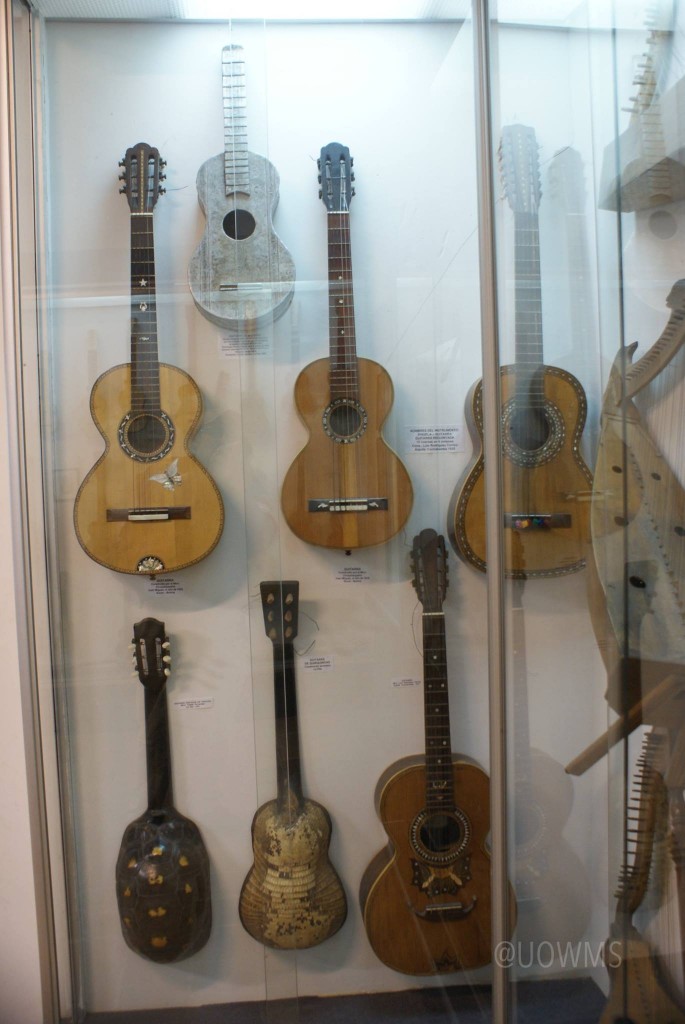MUS 250: Popular Music in a Global Context
MW 10:00-11:50 AM Room: 211 Frohnmayer Music Building
 The US tends to dominate and influence much of the popular music industry, and when flying into virtually any major airport in the world, one can hear the same big hits playing in their surroundings. The technology that makes it easier for people around the world to consume US music, however, makes it easier for music from the rest of the world to reach the US as well. People in all time zones can await the latest cut from BTS to drop on the internet, and Oscar-winning movies in Telugu are streaming on Netflix at the touch of a button. All this access can make the world feel small or homogeneous, but is it?
The US tends to dominate and influence much of the popular music industry, and when flying into virtually any major airport in the world, one can hear the same big hits playing in their surroundings. The technology that makes it easier for people around the world to consume US music, however, makes it easier for music from the rest of the world to reach the US as well. People in all time zones can await the latest cut from BTS to drop on the internet, and Oscar-winning movies in Telugu are streaming on Netflix at the touch of a button. All this access can make the world feel small or homogeneous, but is it?
In this class, we explore several key issues that scholars have been engaging with since the early 20th century, when circulation of recorded music became important. Questions like: does mass produced music have value? Do markets push all music to sound the same? To complicate matters, however, we move these debates to the realm of global popular musics – those popular musics that have had their own significant markets and have been making an impact on the world more generally. We will focus on K-pop, Indian filmi music (like Bollywood hits), and reggaetón, but other musics will be discussed as well. Are the aesthetics and economics of these musics the same as US popular musics? Have they been making an impact on US music? How do they circulate at home and what is their value there?
In the spirit of sharing the outcome of our debates with others, students will form groups to present their ideas in a public forum, either in-person or on the internet. The goal of this presentation is to ensure that knowledge created on campus gets out into local communities and that local communities can share their thoughts with UO students. That way, we also contribute to promoting healthy and well-informed exchanges of ideas in our larger society.
All readings will be posted on Canvas.
MUS 451/551: Introduction to Ethnomusicology
TR 10:00-11:50 AM Room: 167 Frohnmayer Music Building
 Ethnomusicology is often defined as “the study of music in/as culture,” but what does that mean? This class begins with a brief overview of the history of the discipline (Rice) from its origins in U.S. cultural anthropology and German comparative musicology. We will then explore the key concepts one senior ethnomusicologist (Turino) has developed over the course of his career to understand musics as diverse as those found in fiestas patronales in the Andes, Bira ceremonies in Zimbabwe, and contra dances in the Midwest. Finally, we delve into a full-length ethnography to appreciate what an in-depth fieldwork study can produce. Graduate students participating in the class will be assigned additional readings (including a textbook with an overview of critical theory), class preps, and more intensive writing projects. This course fulfills the IC (International Cultures) Multicultural Requirement.
Ethnomusicology is often defined as “the study of music in/as culture,” but what does that mean? This class begins with a brief overview of the history of the discipline (Rice) from its origins in U.S. cultural anthropology and German comparative musicology. We will then explore the key concepts one senior ethnomusicologist (Turino) has developed over the course of his career to understand musics as diverse as those found in fiestas patronales in the Andes, Bira ceremonies in Zimbabwe, and contra dances in the Midwest. Finally, we delve into a full-length ethnography to appreciate what an in-depth fieldwork study can produce. Graduate students participating in the class will be assigned additional readings (including a textbook with an overview of critical theory), class preps, and more intensive writing projects. This course fulfills the IC (International Cultures) Multicultural Requirement.
Texts for 451 (and 551) include:
Rice, Timothy. 2013. Ethnomusicology: A Very Brief Introduction. New York: Oxford University Press.
Additional texts for 551 include:
Berger, Harris M. and Ruth M. Stone. 2019. Theory for Ethnomusicology: Histories, Conversations, and Insights, Second Edition. New York: Routledge.


 One intellectual current within ethnomusicology is the idea of bi-musicality, or the ability to be fluent in more than one musical system. This course emphasizes the practice of music-dance from a specific region/culture and asks students to reflect on how this practice may compare with the musical systems they already have experience with. Students will be asked to take an embodied approach in learning. At the end of the term, students will share what they have learned with others through an end-of-term presentation. Students who are interested in taking the class for additional credit (beyond 2.0 credits) are required to do additional work such as write an end-of-term research paper or produce a creative project related to region in question.
One intellectual current within ethnomusicology is the idea of bi-musicality, or the ability to be fluent in more than one musical system. This course emphasizes the practice of music-dance from a specific region/culture and asks students to reflect on how this practice may compare with the musical systems they already have experience with. Students will be asked to take an embodied approach in learning. At the end of the term, students will share what they have learned with others through an end-of-term presentation. Students who are interested in taking the class for additional credit (beyond 2.0 credits) are required to do additional work such as write an end-of-term research paper or produce a creative project related to region in question.
 Ethnomusicology is often defined as “the study of music in/as culture,” but what does that mean? This class begins with a brief overview of the history of the discipline (Rice) from its origins in U.S. cultural anthropology and German comparative musicology. We will then explore the key concepts one senior ethnomusicologist (Turino) has developed over the course of his career to understand musics as diverse as those found in fiestas patronales in the Andes, Bira ceremonies in Zimbabwe, and contra dances in the Midwest. Finally, we delve into a full-length ethnography to appreciate what an in-depth fieldwork study can produce. Graduate students participating in the class will be assigned additional readings (including a textbook with an overview of critical theory), class preps, and more intensive writing projects. This course fulfills the IC (International Cultures) Multicultural Requirement.
Ethnomusicology is often defined as “the study of music in/as culture,” but what does that mean? This class begins with a brief overview of the history of the discipline (Rice) from its origins in U.S. cultural anthropology and German comparative musicology. We will then explore the key concepts one senior ethnomusicologist (Turino) has developed over the course of his career to understand musics as diverse as those found in fiestas patronales in the Andes, Bira ceremonies in Zimbabwe, and contra dances in the Midwest. Finally, we delve into a full-length ethnography to appreciate what an in-depth fieldwork study can produce. Graduate students participating in the class will be assigned additional readings (including a textbook with an overview of critical theory), class preps, and more intensive writing projects. This course fulfills the IC (International Cultures) Multicultural Requirement. The Americas is a broad geographic expanse covering a range of cultures that is impossible to cover in-depth in a single academic term. There are ideas, however, that can help us bring important aspects of these cultures together: colonialism, processes of cultural exchange, and modernity. We will study these ideas through the music and cultures of at least three countries in the Americas (Brazil, Mexico, and Peru). No musical experience is necessary, but students will be asked to think through listening examples to understand why different musics sound the way they do. While we focus on three regions, the ideas are applicable throughout the Americas, including the United States. This course is designed to fulfill a Cultural Literacy Requirement.
The Americas is a broad geographic expanse covering a range of cultures that is impossible to cover in-depth in a single academic term. There are ideas, however, that can help us bring important aspects of these cultures together: colonialism, processes of cultural exchange, and modernity. We will study these ideas through the music and cultures of at least three countries in the Americas (Brazil, Mexico, and Peru). No musical experience is necessary, but students will be asked to think through listening examples to understand why different musics sound the way they do. While we focus on three regions, the ideas are applicable throughout the Americas, including the United States. This course is designed to fulfill a Cultural Literacy Requirement. General class description: One intellectual current within ethnomusicology is the idea of bi-musicality, or the ability to be fluent in more than one musical system. This course emphasizes the practice of music-dance from a specific region/culture and asks students to reflect on how this practice may compare with the musical systems they already have experience with. Students will be asked to take an embodied approach in learning. At the end of the term, students will share what they have learned with others through an end-of-term presentation. Students who may be interested in taking the class for additional credit (beyond 2.0 credits) can arrange to do additional work such as write an end-of-term research paper or produce a creative project related to region in question.
General class description: One intellectual current within ethnomusicology is the idea of bi-musicality, or the ability to be fluent in more than one musical system. This course emphasizes the practice of music-dance from a specific region/culture and asks students to reflect on how this practice may compare with the musical systems they already have experience with. Students will be asked to take an embodied approach in learning. At the end of the term, students will share what they have learned with others through an end-of-term presentation. Students who may be interested in taking the class for additional credit (beyond 2.0 credits) can arrange to do additional work such as write an end-of-term research paper or produce a creative project related to region in question. Musical instruments are tools that humans have created to shape their sound environments. They reflect the cultural values that communities of humans share. In this class, we will examine these tools, seeking to understand how they work: mechanically, aesthetically, and socially. We will also explore how and why scholars have studied musical instruments, even taking the time to build some. Questions include: why have some musical instruments become icons of a nation? How should we classify the vast number of instruments in the world? What does it mean for instruments to circulate around the world? Students will have the opportunity to research an instrument of their choice more thoroughly. This course is designed to fulfill the Global Perspectives category of the Cultural Literacy Core Education requirement.
Musical instruments are tools that humans have created to shape their sound environments. They reflect the cultural values that communities of humans share. In this class, we will examine these tools, seeking to understand how they work: mechanically, aesthetically, and socially. We will also explore how and why scholars have studied musical instruments, even taking the time to build some. Questions include: why have some musical instruments become icons of a nation? How should we classify the vast number of instruments in the world? What does it mean for instruments to circulate around the world? Students will have the opportunity to research an instrument of their choice more thoroughly. This course is designed to fulfill the Global Perspectives category of the Cultural Literacy Core Education requirement.